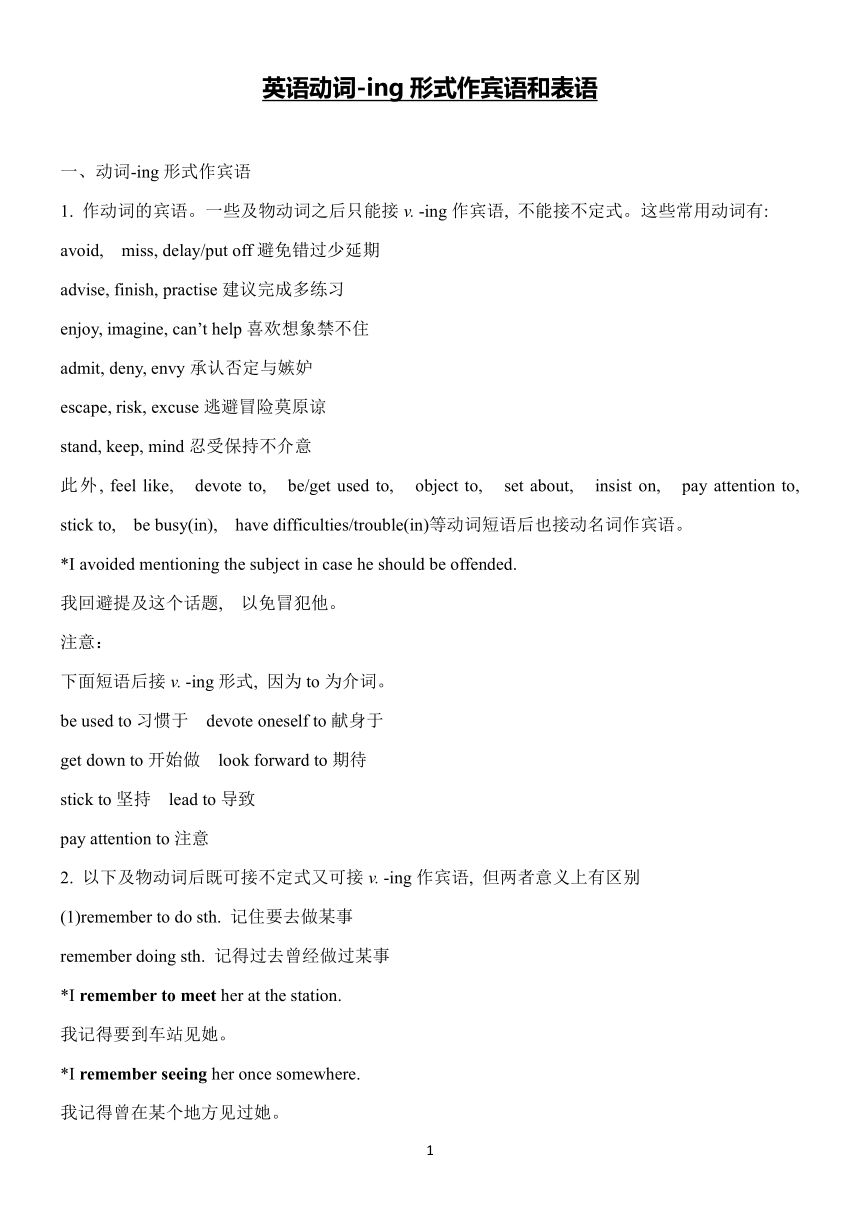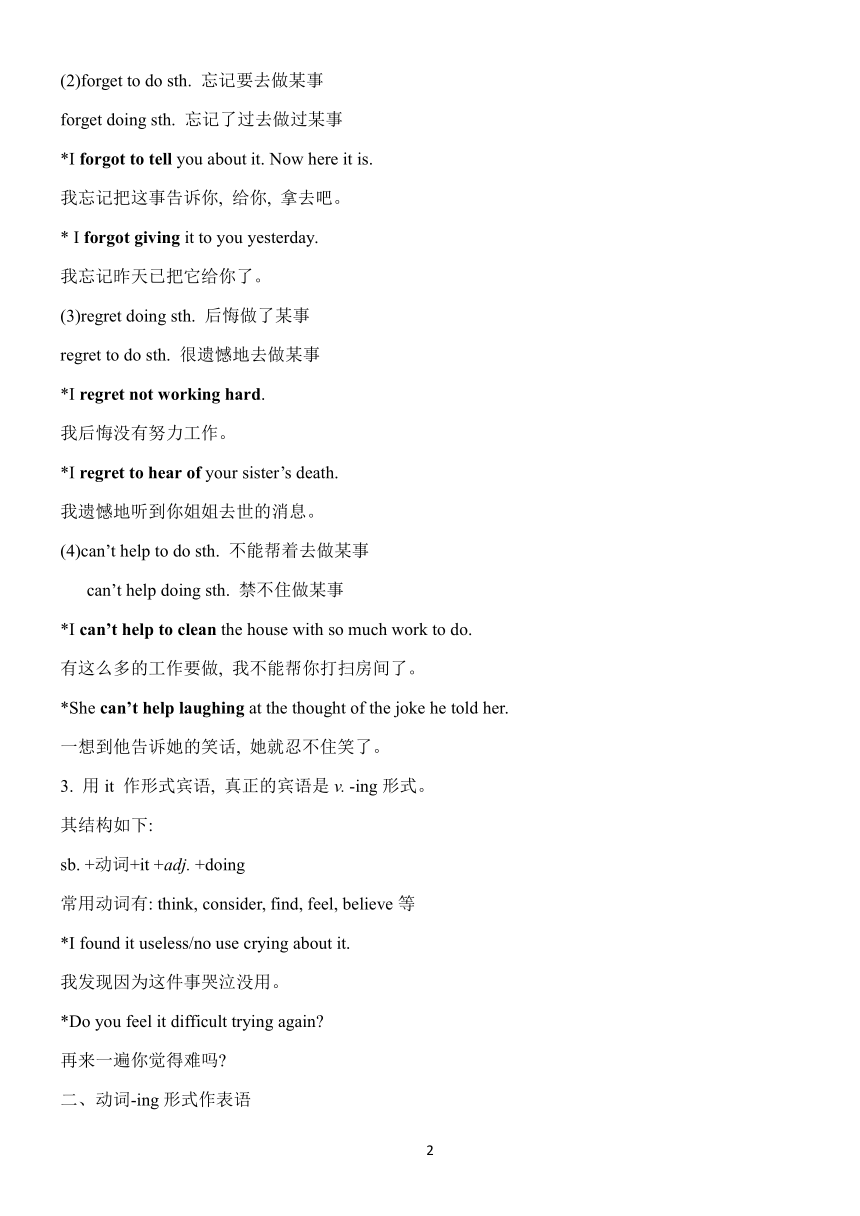2024届语法复习 英语动词-ing形式作宾语和表语学案(无答案)
文档属性
| 名称 | 2024届语法复习 英语动词-ing形式作宾语和表语学案(无答案) |

|
|
| 格式 | doc | ||
| 文件大小 | 37.7KB | ||
| 资源类型 | 教案 | ||
| 版本资源 | 人教版(2019) | ||
| 科目 | 英语 | ||
| 更新时间 | 2023-11-06 11:02:43 | ||
图片预览


文档简介
英语动词-ing形式作宾语和表语
一、动词-ing形式作宾语
1. 作动词的宾语。一些及物动词之后只能接v. -ing作宾语, 不能接不定式。这些常用动词有:
avoid, miss, delay/put off避免错过少延期
advise, finish, practise建议完成多练习
enjoy, imagine, can’t help喜欢想象禁不住
admit, deny, envy承认否定与嫉妒
escape, risk, excuse逃避冒险莫原谅
stand, keep, mind忍受保持不介意
此外, feel like, devote to, be/get used to, object to, set about, insist on, pay attention to, stick to, be busy(in), have difficulties/trouble(in)等动词短语后也接动名词作宾语。
*I avoided mentioning the subject in case he should be offended.
我回避提及这个话题, 以免冒犯他。
注意:
下面短语后接v. -ing形式, 因为to为介词。
be used to习惯于 devote oneself to献身于
get down to开始做 look forward to期待
stick to坚持 lead to导致
pay attention to注意
2. 以下及物动词后既可接不定式又可接v. -ing作宾语, 但两者意义上有区别
(1)remember to do sth. 记住要去做某事
remember doing sth. 记得过去曾经做过某事
*I remember to meet her at the station.
我记得要到车站见她。
*I remember seeing her once somewhere.
我记得曾在某个地方见过她。
(2)forget to do sth. 忘记要去做某事
forget doing sth. 忘记了过去做过某事
*I forgot to tell you about it. Now here it is.
我忘记把这事告诉你, 给你, 拿去吧。
* I forgot giving it to you yesterday.
我忘记昨天已把它给你了。
(3)regret doing sth. 后悔做了某事
regret to do sth. 很遗憾地去做某事
*I regret not working hard.
我后悔没有努力工作。
*I regret to hear of your sister’s death.
我遗憾地听到你姐姐去世的消息。
(4)can’t help to do sth. 不能帮着去做某事
can’t help doing sth. 禁不住做某事
*I can’t help to clean the house with so much work to do.
有这么多的工作要做, 我不能帮你打扫房间了。
*She can’t help laughing at the thought of the joke he told her.
一想到他告诉她的笑话, 她就忍不住笑了。
3. 用it 作形式宾语, 真正的宾语是v. -ing形式。
其结构如下:
sb. +动词+it +adj. +doing
常用动词有: think, consider, find, feel, believe等
*I found it useless/no use crying about it.
我发现因为这件事哭泣没用。
*Do you feel it difficult trying again
再来一遍你觉得难吗
二、动词-ing形式作表语
1. v. -ing形式作表语, 表示抽象的一般性的行为, 用来说明主语的内容, 与主语通常是同一概念, 表语和主语通常可以交换位置。
*In the ant city, the queen’s job is laying eggs.
=In the ant city, laying eggs is the queen’s job.
在蚂蚁王国, 蚁后的工作是产卵。
2. v. -ing形式作表语, 可以表示主语的某种性质或特征, 这类词可以看作形容词。
*The film being shown in the cinema is exciting.
正在电影院上演的电影很激动人心。
*The present situation is inspiring.
当前的形势鼓舞人心。
【基础训练】
Ⅰ. 单句语法填空
1. After (think) for some time, I finally made up my mind to give up.
2. Her job is (keep) the lecture hall as clean as possible.
3. Mr Reed made up his mind to devote all he had to (set up)some schools for poor children.
4. The argument is very (convince).
5. Keep on (try) and you will succeed.
6. He had a terrific sense of humour and could be very (amuse).
7. Though it sounds a bit too expensive, it is worth (buy).
8. He remained (stand) beside the table.
9. She is very busy (write) her papers. She is far too busy (receive) callers.
Ⅱ. 完成句子
1. your computer a little, please
请把你的电脑(音量)关小一点好吗
2. Her job is ____________________________
她的工作是洗衣服、打扫卫生和照顾孩子。
3. We all believe that if a book is interesting, it will surely ____________________________ .
我们都相信, 如果一本书有趣, 它一定会引起读者的兴趣。
4. I ________________________________________________________ .
我承认犯了一个严重的错误。
5. It is worthwhile ____________________________ .
在教育上多花钱是值得的。
6. I can’t imagine ____________________________ his parents.
我难以想象那个男孩对他的父母说话那么粗鲁。
7. Mr Jones decided to walk to the university ____________________________
琼斯先生决定步行去大学而不坐出租车。
8. While going shopping, people sometimes can’t help ____________________________.
在购物时, 人们有时会情不自禁地被说服去买他们不需要的东西。
9. I regret ____________________________ I have no choice but to refuse your application.
我很遗憾地告诉你, 除了拒绝你的申请, 我别无选择。
10. Many people ____________________________ more rules to protect animal rights.
很多人都建议制定规则以保护动物权益。
【今日题型】语篇训练【语法填空】
IV. 语法填空
阅读下面材料, 在空白处填入适当的内容(1个单词)或括号内单词的正确形式。
I chatted with my friend in a well-known coffee shop in a town of Italy.
As we enjoyed our coffee, a man entered and 1. (sit) beside us. He called the waiter over and said, “Two 2. (cup) of coffee, one of them there on the wall. ”We heard his order with interest and noticed that he was served one cup of coffee but he paid for two.
When he left, the waiter put a piece of paper on the wall, 3. (say) “A Cup of Coffee”. While we were still there, two other men entered and ordered the coffee, two on the table and one on the wall. They had two but paid for three. This time the waiter also did 4. same thing. It was something 5. (usual) for us. After a few days, we had a chance 6. (enter) this coffee shop again. While we were enjoying our coffee, a man 7. appeared homeless entered. He looked at the wall and said, “One cup of coffee from the wall. ”
The waiter served a cup of coffee to this man 8. (polite). The man had his coffee and left without paying. We were 9. (amaze) to watch all of this as the waiter took a piece of paper off the wall 10. threw it into the bin.
【今日作业】语法填空
We Love Reading is a programme that ____1____ (plant) die love of reading within children. It focuses on training adults, most of____2___ are local volunteers, to hold read-aloud sessions in public spaces in their neighborhoods where books are____3_____ (regular)read aloud and exchanged with children
Research has shown that 80% of children who attend We Love Reading read-aloud sessions have seen the_____4_____(attract)of reading books, and are more willing ___5____(go)back to school because they associate reading with enjoyment They are more empathetic(同情)because they learn about other cultures and people, and as____6____ result perform better at school and become more ___7_____(confidence).
We Love Reading has also influenced parent-child relationships by___8_____ (build)bridges of understanding and communication___9_____ the two generations through reading.
We Love Reading is effective and able to continue for a long time because it____10____ (manage) and owned by local volunteers. They are part of the community and know when and where is best to read to children.
一、动词-ing形式作宾语
1. 作动词的宾语。一些及物动词之后只能接v. -ing作宾语, 不能接不定式。这些常用动词有:
avoid, miss, delay/put off避免错过少延期
advise, finish, practise建议完成多练习
enjoy, imagine, can’t help喜欢想象禁不住
admit, deny, envy承认否定与嫉妒
escape, risk, excuse逃避冒险莫原谅
stand, keep, mind忍受保持不介意
此外, feel like, devote to, be/get used to, object to, set about, insist on, pay attention to, stick to, be busy(in), have difficulties/trouble(in)等动词短语后也接动名词作宾语。
*I avoided mentioning the subject in case he should be offended.
我回避提及这个话题, 以免冒犯他。
注意:
下面短语后接v. -ing形式, 因为to为介词。
be used to习惯于 devote oneself to献身于
get down to开始做 look forward to期待
stick to坚持 lead to导致
pay attention to注意
2. 以下及物动词后既可接不定式又可接v. -ing作宾语, 但两者意义上有区别
(1)remember to do sth. 记住要去做某事
remember doing sth. 记得过去曾经做过某事
*I remember to meet her at the station.
我记得要到车站见她。
*I remember seeing her once somewhere.
我记得曾在某个地方见过她。
(2)forget to do sth. 忘记要去做某事
forget doing sth. 忘记了过去做过某事
*I forgot to tell you about it. Now here it is.
我忘记把这事告诉你, 给你, 拿去吧。
* I forgot giving it to you yesterday.
我忘记昨天已把它给你了。
(3)regret doing sth. 后悔做了某事
regret to do sth. 很遗憾地去做某事
*I regret not working hard.
我后悔没有努力工作。
*I regret to hear of your sister’s death.
我遗憾地听到你姐姐去世的消息。
(4)can’t help to do sth. 不能帮着去做某事
can’t help doing sth. 禁不住做某事
*I can’t help to clean the house with so much work to do.
有这么多的工作要做, 我不能帮你打扫房间了。
*She can’t help laughing at the thought of the joke he told her.
一想到他告诉她的笑话, 她就忍不住笑了。
3. 用it 作形式宾语, 真正的宾语是v. -ing形式。
其结构如下:
sb. +动词+it +adj. +doing
常用动词有: think, consider, find, feel, believe等
*I found it useless/no use crying about it.
我发现因为这件事哭泣没用。
*Do you feel it difficult trying again
再来一遍你觉得难吗
二、动词-ing形式作表语
1. v. -ing形式作表语, 表示抽象的一般性的行为, 用来说明主语的内容, 与主语通常是同一概念, 表语和主语通常可以交换位置。
*In the ant city, the queen’s job is laying eggs.
=In the ant city, laying eggs is the queen’s job.
在蚂蚁王国, 蚁后的工作是产卵。
2. v. -ing形式作表语, 可以表示主语的某种性质或特征, 这类词可以看作形容词。
*The film being shown in the cinema is exciting.
正在电影院上演的电影很激动人心。
*The present situation is inspiring.
当前的形势鼓舞人心。
【基础训练】
Ⅰ. 单句语法填空
1. After (think) for some time, I finally made up my mind to give up.
2. Her job is (keep) the lecture hall as clean as possible.
3. Mr Reed made up his mind to devote all he had to (set up)some schools for poor children.
4. The argument is very (convince).
5. Keep on (try) and you will succeed.
6. He had a terrific sense of humour and could be very (amuse).
7. Though it sounds a bit too expensive, it is worth (buy).
8. He remained (stand) beside the table.
9. She is very busy (write) her papers. She is far too busy (receive) callers.
Ⅱ. 完成句子
1. your computer a little, please
请把你的电脑(音量)关小一点好吗
2. Her job is ____________________________
她的工作是洗衣服、打扫卫生和照顾孩子。
3. We all believe that if a book is interesting, it will surely ____________________________ .
我们都相信, 如果一本书有趣, 它一定会引起读者的兴趣。
4. I ________________________________________________________ .
我承认犯了一个严重的错误。
5. It is worthwhile ____________________________ .
在教育上多花钱是值得的。
6. I can’t imagine ____________________________ his parents.
我难以想象那个男孩对他的父母说话那么粗鲁。
7. Mr Jones decided to walk to the university ____________________________
琼斯先生决定步行去大学而不坐出租车。
8. While going shopping, people sometimes can’t help ____________________________.
在购物时, 人们有时会情不自禁地被说服去买他们不需要的东西。
9. I regret ____________________________ I have no choice but to refuse your application.
我很遗憾地告诉你, 除了拒绝你的申请, 我别无选择。
10. Many people ____________________________ more rules to protect animal rights.
很多人都建议制定规则以保护动物权益。
【今日题型】语篇训练【语法填空】
IV. 语法填空
阅读下面材料, 在空白处填入适当的内容(1个单词)或括号内单词的正确形式。
I chatted with my friend in a well-known coffee shop in a town of Italy.
As we enjoyed our coffee, a man entered and 1. (sit) beside us. He called the waiter over and said, “Two 2. (cup) of coffee, one of them there on the wall. ”We heard his order with interest and noticed that he was served one cup of coffee but he paid for two.
When he left, the waiter put a piece of paper on the wall, 3. (say) “A Cup of Coffee”. While we were still there, two other men entered and ordered the coffee, two on the table and one on the wall. They had two but paid for three. This time the waiter also did 4. same thing. It was something 5. (usual) for us. After a few days, we had a chance 6. (enter) this coffee shop again. While we were enjoying our coffee, a man 7. appeared homeless entered. He looked at the wall and said, “One cup of coffee from the wall. ”
The waiter served a cup of coffee to this man 8. (polite). The man had his coffee and left without paying. We were 9. (amaze) to watch all of this as the waiter took a piece of paper off the wall 10. threw it into the bin.
【今日作业】语法填空
We Love Reading is a programme that ____1____ (plant) die love of reading within children. It focuses on training adults, most of____2___ are local volunteers, to hold read-aloud sessions in public spaces in their neighborhoods where books are____3_____ (regular)read aloud and exchanged with children
Research has shown that 80% of children who attend We Love Reading read-aloud sessions have seen the_____4_____(attract)of reading books, and are more willing ___5____(go)back to school because they associate reading with enjoyment They are more empathetic(同情)because they learn about other cultures and people, and as____6____ result perform better at school and become more ___7_____(confidence).
We Love Reading has also influenced parent-child relationships by___8_____ (build)bridges of understanding and communication___9_____ the two generations through reading.
We Love Reading is effective and able to continue for a long time because it____10____ (manage) and owned by local volunteers. They are part of the community and know when and where is best to read to children.
